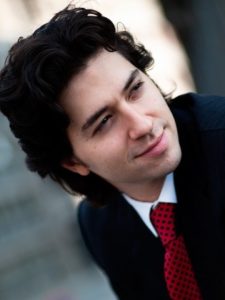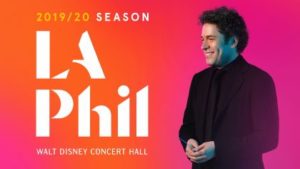
LA PHIL — IT’S WHAT’S FOR DINNER
Argentina, Mexico, Venezuela and the U.S. were represented in the sensational concert last night at Disney Hall. The program Dudamel Conducts Music of the Americas has the conductor collecting pieces that were inspired by folk music and celebrate peoples who came before. Two of the four pieces — Copeland’s Rodeo and Chávez’s Sinfonía india — conjured up images of wide open spaces where gauchos and ranchers worked the wide-open untamed land; one piece — Copeland’s Fanfare for the Common Man — roused, united, celebrated and called us to that action; but the fourth work on the bill that runs through Sunday — Benzecry’s Universos infinitos — felt like a modernistic soundtrack to a cool haunted house. While the latter didn’t really create images of source material through music (“ancestral universes” and the “struggle of the Mapuche people” per the composer, who was in attendance), it was a thrilling, dynamic, jaw-dropping showcase for Venezuelan pianist Sergio Tiempo.
Most of the symphonies by self-taught Mexican composer Carlos Chávez (1899-1978) are not that ”nationalistic” inspiration you’ll hear in Copeland, but more modernist. Chávez’s style is heavily based on traditional Mexican music, but to a large extent he uses material of pre-Hispanic origin and arranges it into opulent sound via a large, late-romantic orchestra. His most famous, Sinfonía india (Symphony No. 2) (1936), is far and away his most accessible; it’s more like a dramatic, highly effective tone poem. In it, he spans the spectrum from quiet, almost entrancing music to loud, compelling passages full of joy and adventure.
In Dudamel’s hands, I was ready to jump into a Conestoga wagon and race to nab my own private 40 acres of heaven. Dudamel was always a genius at pulling out flavors from the orchestra — here it is James Wilt’s crystalline trumpet, Sarah Jackson’s perky piccolo, and the chirpy flutes of Denis Bouriakov and Catherine Ransom Karoly — and all the players are in top form; but I believe our conductor is getting even better at building an arc and telling a story.
The jaunty, exhilarating surge at the top is palpable; the tribal, tender and tranquil tom-tom is followed with woodwinds lightly dominating until they build with all the color of the, well, wind. When the strings come in tutti after a build, the impelling adventure and driving force is fierce. When softening again, it is like being in a peaceful canyon; the orchestrations evoke images of both the natural world and the culture of Native Americans. This 11-minute revelation would make a terrific ballet!
 Another revelation is Tiempo: How is it possible that he even memorized those demanding piano parts in the world premiere of Esteban Benzecry’s 2011, 3-movement, 26-minute, LA Phil commission Universos infinitos: Hurling, rapid arpeggios ending in large full-hand trills; hard-hit octaves; forearms smashing thunderously on the bass notes; and strumming a mallet heavily on the piano strings. It’s like Prokofiev with a hammer or Liszt gone mad. The first movement “Un mundo interior” is ferocious, the second “Ñuque Cuyén” sensitive and the third “Toccata Willka Kuti” thrilling. The driving impetus of this work is deliciously relentless, so forget subtlety (think car chase instead of an infinite universe). The colors of the orchestrations are outstanding (I especially loved the echoes of the flutes just behind the beat). This is a soundscape, so the panoply of percussion used is particularly phenomenal (Matthew Howard led the section): waterphone, rainstick, güiro, cuíca, water gong, and plenty more. While there are many great moments, and the second movement is more like a journey, the work keeps going in different directions — which very much speaks to the Americas today.
Another revelation is Tiempo: How is it possible that he even memorized those demanding piano parts in the world premiere of Esteban Benzecry’s 2011, 3-movement, 26-minute, LA Phil commission Universos infinitos: Hurling, rapid arpeggios ending in large full-hand trills; hard-hit octaves; forearms smashing thunderously on the bass notes; and strumming a mallet heavily on the piano strings. It’s like Prokofiev with a hammer or Liszt gone mad. The first movement “Un mundo interior” is ferocious, the second “Ñuque Cuyén” sensitive and the third “Toccata Willka Kuti” thrilling. The driving impetus of this work is deliciously relentless, so forget subtlety (think car chase instead of an infinite universe). The colors of the orchestrations are outstanding (I especially loved the echoes of the flutes just behind the beat). This is a soundscape, so the panoply of percussion used is particularly phenomenal (Matthew Howard led the section): waterphone, rainstick, güiro, cuíca, water gong, and plenty more. While there are many great moments, and the second movement is more like a journey, the work keeps going in different directions — which very much speaks to the Americas today.
After the intermission and a stirring strong brass section in the 3-minute Fanfare for the Common Man, Dudamel detonated Copeland’s entire 36-minute Rodeo ballet into the universe that Benzecry wrote about. Hands down the best version I have ever heard, the players seem ignited by Dudamel’s blast (and they all are having a blast, too). Rodeo tells the story of a cowgirl and how she tries to wrangle herself a cowboy, which allows the players to plow personality into their performance. Shawn Crockett’s percolating bassoon, David Rejano Cantero’s comical trombone, Tom Hooten’s come-a-runnin’ trumpet, Boris Allakhverdyan’s plaintive clarinet, Christopher Hanulik’s basses buzzing like bees, and Joanne Pearce Martin nailing that left-hand stride in her solo honky-tonk piano. Those wide-open vistas, lonely melodies so beautiful it aches, and raucous Western rhythms are all captured with an irresistible charm, but also power, by Dudamel. A remarkable performance.
The LA Phil. It’s what’s for dinner.
photos courtesy of LA Phil
Dudamel Conducts Music from the Americas
Los Angeles Philharmonic
Gustavo Dudamel, conductor
Walt Disney Concert Hall, 111 S. Grand Ave.
ends on October 13, 2019
for tickets, call 323.850.2000 or visit LA Phil



{ 2 comments… read them below or add one }
Thanks for a great review, but it was Tom Hooten’s trumpet on the Copland. I played the Benzecry.
J
Well, Jim, this is the second time I switched it up! Thanks for letting me know.